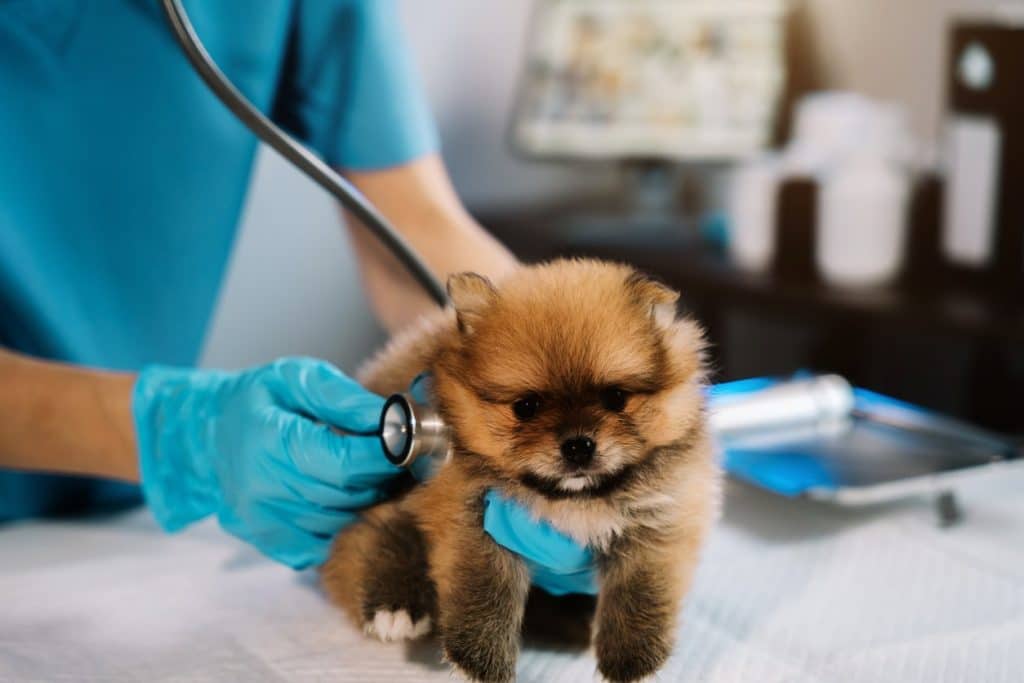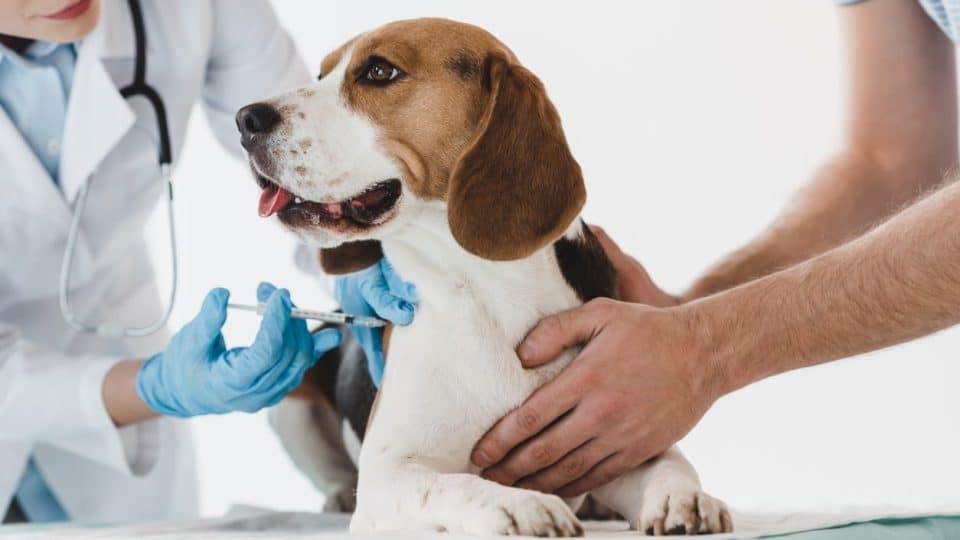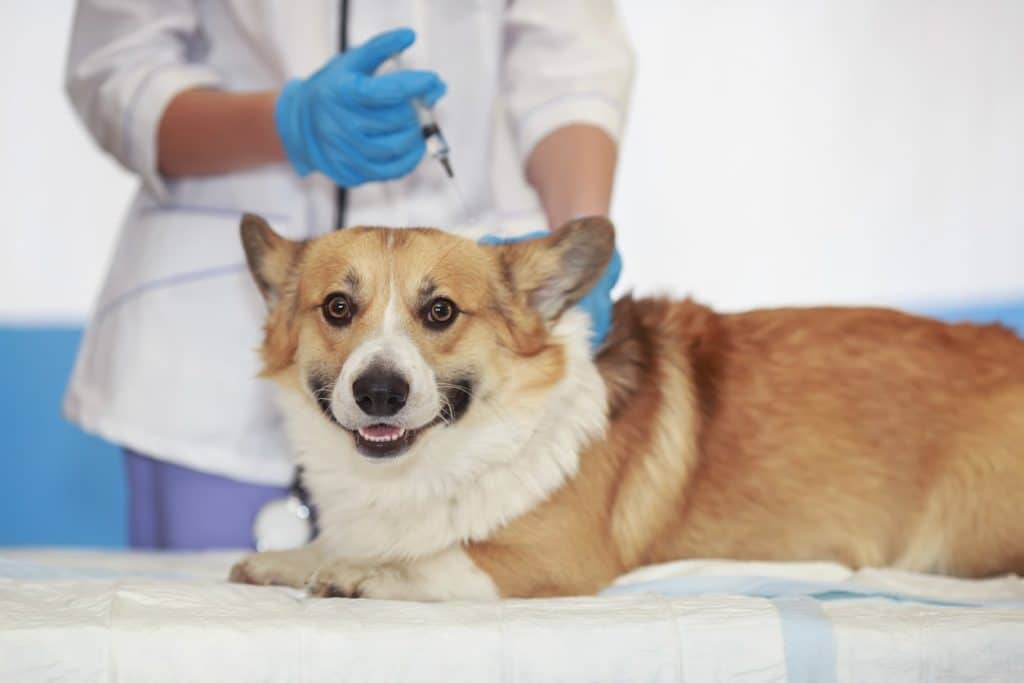- Not a substitute for professional veterinary help.
As you prepare life for your new puppy, you may be surprised at the rigorous schedule of vaccines. Why do puppies need so many vaccines in the first year? “The reason for multiple vaccines in the first year is to ensure that the puppy’s immune response is strong and long-lasting,” says board-certified veterinary immunologist Dr. Mohamed Abouelkhair, DVM, MS, Ph.D., DACVM, CABMM.
Initially, antibodies in their mother’s milk help support a puppy’s immune system. However, as a puppy grows, Dr. Abouekhair says this maternal protection diminishes, leaving a puppy’s immune system vulnerable to potentially fatal diseases. This is where vaccines come in. Vaccines give a puppy’s immune system the opportunity to develop its defense against diseases.
Below, learn more about everything puppy vaccines, including which vaccines are essential and when to get them so your puppy is safe outside.
What Shots Do Puppies Need & When?
The table below offers a quick peek at a basic puppy vaccination timeline based on World Small Animal Veterinary Association (WASAVA) guidelines.
| Puppy Age | Required Vaccines | Optional Vaccines |
| 6-8 weeks | Distemper, Adenovirus, Parvovirus, Parainfluenza | Bordetella |
| 10-12 weeks | Distemper, Adenovirus, Parvovirus, Parainfluenza | Canine Influenza, Leptospirosis, Bordetella, Lyme Disease |
| 16-18 weeks | Distemper, Adenovirus, Parvovirus, Parainfluenza, Rabies | Canine Influenza, Leptospirosis, Bordetella, Lyme disease |
| 12-16 months | Distemper, Adenovirus, Parvovirus, Parainfluenza, Rabies | Leptospirosis, Bordetella, Lyme disease, Coronavirus |
| Every 1-2 years | Distemper, Adenovirus, Parvovirus, Parainfluenza | Canine Influenza, Leptospirosis, Bordetella, Lyme disease, Coronavirus |
| Every 1-3 years | Rabies |
What Do These Puppy Vaccines Protect Against?
Puppy vaccinations are split into two categories: core vaccines and non-core vaccines. “Core vaccines protect against highly contagious and potentially life-threatening diseases that are widespread and pose a significant risk,” Dr. Abouelkhair says. These are the vaccines your new puppy will require. Non-core vaccines are optional. Dr. Abouelkhair says your puppy’s recommended vaccines may be based on a pet’s lifestyle, geographic location, and risk factors.
Here’s a breakdown of the core and optional vaccines your puppy may need within the first year.
Core puppy vaccines
These shots will come first in a typical puppy vaccine schedule and are considered standard protocol for protecting your puppy.
-
- Distemper: This contagious viral disease is spread through airborne exposure and shared food and water bowls. Distemper attacks a dog’s respiratory, nervous, and GI systems. Because it’s incurable, preventative vaccination is critical.
- Parvovirus: Parvovirus attacks the gastrointestinal system, and scientists are still working to develop a cure. Fatal dehydration from the disease can occur within 72 hours, so infected dogs require immediate veterinary intervention.
- Adenovirus (hepatitis): Canine hepatitis affects a dog’s liver, kidney, lungs, spleen, and eyes. If the disease progresses, it can be deadly. No cure exists, but symptoms can be managed by a vet.
- Parainfluenza: Not to be confused with canine influenza, parainfluenza is a highly contagious respiratory virus typically transmitted through contact with other dogs.
- Rabies: This virus attacks the nervous system and is usually transmitted through the bite of an infected animal. Regular rabies vaccinations are required by law in most states.
- DHPP: Many vets administer a combination vaccine that covers distemper, hepatitis, parainfluenza, and parvo. This is given incrementally as a puppy gets older.
-
iStock/Nataba
Optional puppy vaccines
Dr. Abouelkhair recommends assessing optional puppy vaccine needs on an individual basis. While some vaccines are necessary for your puppy’s health and longevity, there are others that will protect your puppy from less common or severe threats to their health depending on where they live, their medical history, or other environmental factors. Talk to your vet to see if your puppy needs any of the following shots:
- Leptospirosis: While Leptospirosis is considered a non-core vaccine, Dr. Abouelkhair tells us that most dog parents in North America should consider it. Usually found in contaminated water, Leptospirosis is endemic throughout much of the continent. Lastly, it’s also zoonotic and can be life-threatening.
- Bordetella: This is the most common bacterium that causes kennel cough. Dogs are most likely to encounter Bordetella when they’re in close quarters, such as at dog parks, boarding kennels, grooming facilities, and dog shows.
- Lyme disease: This is spread through ticks infected with the bacteria Borrelia burgdorferi. Vaccines for Lyme disease are generally recommended for dogs who live in areas where ticks are prevalent. According to the CDC, Lyme disease is most frequently reported in the upper midwestern, northeastern, and mid-Atlantic states.
- Canine influenza: The canine flu spreads easily from one dog to another. This vaccine protects dogs against two virus strains that cause the majority of cases: H3N8 and H3N2. It’s often recommended for dogs who will be in close proximity to other dogs (i.e., boarding, dog shows, doggy daycare).
- Coronavirus: This virus is not the same one that causes Covid-19 in humans. Canine coronavirus causes gastrointestinal problems in dogs. It’s spread through oral contact with infected fecal matter, food bowls, or an infected dog.
- Rattlesnake vaccine: If you live in an area where rattlesnakes are a threat, this vaccine protects dogs from their venom.
What If I’m Late on Puppy Vaccinations?
Timely vaccinations are critical for developing your pup’s immunity, Dr. Abouelkhair explains. Late or missed vaccinations can compromise your puppy’s health, leaving them susceptible to preventable diseases during a period of vulnerability.
“In some cases, catching up on missed vaccinations may require restarting the series, subjecting your puppy to unnecessary stress and cost,” he adds. For the best protection against disease, try to stick to your vet’s recommended puppy vaccine schedule.

iStock/Thicha Satapitanon
Are Puppy Vaccine Reactions Common?
After a vaccination, some mild reactions are to be expected. “These reactions are generally short-lived and not cause for major concern,” Dr. Abouelkhair assures. Additionally, he says your puppy may experience temporary redness or discomfort at the injection site, a slight fever, or reduced appetite. Usually, these side effects will only last 24-48 hours.
However, if your dog experiences a more serious allergic reaction or symptoms that won’t go away, notify your vet immediately. This is unlikely to occur, though.
“Vaccine reactions are rare, and the benefits of vaccination greatly outweigh the potential risks,” Dr. Abouelkhair says. All in all, following a puppy vaccine schedule can help pet parents keep their new pups healthy for the first year and beyond.
How Much Do Puppy Vaccinations Cost?
On average, puppy vaccinations will cost between $25-75 each. As your dog gets older, these upfront costs will diminish, as they will need less frequent vaccinations.
Prices for puppy vaccines vary, depending largely on your location. For example, if you live in a densely populated area, you may pay more for vaccinations than those in a rural setting. While you may not be excited about these additional costs, vaccinations can save you in the long run. Not only do they protect your new family member against disease, but they also protect you from the costs of expensive treatments and medications should they get sick. Moreover, for puppies, they protect them from preventable and painful life-threatening diseases.
Luckily, there are low cost options for vaccines. You may also be able to find affordable vaccinations through shelters like the Animal Humane Society, which hosts monthly vaccine clinics. You may also benefit from a pet insurance policy add-on wellness plans. Most pet insurance companies do not cover routine visits and vaccines unless you are enrolled in their wellness or preventative plan.
Can Puppies Go Outside Before They’re Vaccinated?
Yes, unvaccinated puppies can go outside—but take certain precautions. Avoid high-risk areas where other dogs are present, like the dog park. “While puppies can benefit from early socialization, taking them to public places with unknown dogs before completing their vaccinations can expose them to diseases,” Dr. Abouelkhair says. Puppies can venture into your backyard five to seven days after their first round of vaccinations, as long as your garden or lawn is well-maintained. At this stage, puppies can safely interact with other familiar dogs who are fully vaccinated.
Tips on protecting your dog before they have all their vaccines:
- A dog backpack or carrier is an excellent way to socialize your dog to noises, people, and environments without risking bacterial or viral contamination.
- Only meet with dogs who have confirmed vaccination statuses.
- Enroll in puppy training courses and camps where other similar-aged and protected dogs can play.
- Before your puppy goes outside, walk around and check that it’s free from potential hazards and animal waste.
Speak with your veterinarian about safe socialization practices and the specific risks your local area may pose.
Takeaway
Bringing home a puppy is an exciting time! And as new puppy parents will quickly learn, it also involves a lot of preparation. You’ll need toys, food, a bed, and a plan for training your young pup. Amidst all the fun and excitement, one of the less glamorous tasks on your new puppy checklist is setting up a puppy vaccination schedule.
While vet appointments don’t thrill us, vaccines are essential to keeping your new puppy—and other pets and human family members—safe and healthy. Fortunately, your vet is there to take you through every step of the process. If you have any questions about the vaccines your puppy needs, talk to your vet.







